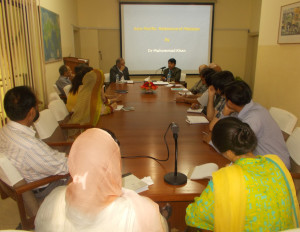National Confrence 10/09/2014
1. A guest lecture on “Asia Pacific: Relevance of Pakistan” was organized by the Islamabad Policy Research Institute (IPRI) on August 28,  2014. Dr. Muhammad Khan, Head of Department (HOD) Faculty of Contemporary Studies (FCS), National Defence University (NDU) delivered the lecture. He discussed various security, economic and political aspects of Asia Pacific coupled with their impact on Pakistan and its policies. The salient points of the lecture are:
2014. Dr. Muhammad Khan, Head of Department (HOD) Faculty of Contemporary Studies (FCS), National Defence University (NDU) delivered the lecture. He discussed various security, economic and political aspects of Asia Pacific coupled with their impact on Pakistan and its policies. The salient points of the lecture are:
• The region includes East Asia, South East Asia and Oceania. The regional economies are heterogeneous. These are emerging markets and experiencing rapid economic growth.
• US role in Asia Pacific is changing according to its ‘Pivot to Asia Policy’. Although the US is facing various challenges in the region, it will remain a major player in Asia Pacific and will try to minimize the emerging role of China. In this context, the US wants its allies in the region including Japan, South Korea, some members of ASEAN, Australia and even India to support its strategy of containing rising China. In this regard China-Japan tensions are a matter of concern for regional countries.
• The parallel rise of India poses a strategic challenge to China and a great concern for Pakistan.
• Strategic history of the region focuses primarily on the interactions between United States, China, Russia and Japan. Since main strategic interest of the US in East Asia is to establish a balance of power on the western shore of the vast Pacific Ocean. Throughout the gyrations of East Asian power alterations, the US is pursuing equilibrium with remarkable tenacity, initiating with brokering the peace at Portsmouth in 1905, which ended Russo-Japan war. The war set the balance of power in the Pacific for the 20th century with the emergence of Japan as a major power and the US as a global player. The US fought most of their wars, i.e., the war against Japan, Korean War and the Vietnam War, to maintain balance of power in the region.
• America’s overriding concern is balance of power in the region. The East Asian quadrilateral has fluctuated constantly over time and since 1991, serious tensions have emerged between the US and China. Owing to the contemporary voluminous trade flowing into and out of East Asia, Sino-US war is least expected. China does not pose a threat to the US, resembling former USSR.
• During last two decades, East Asia has become a major economic region. East Asia now accounts for 25% of global exports, almost 25% of global imports and 21% of foreign direct investment in the world. The most gripping figure of all is that 63 percent of international reserves are held by the countries of East Asia. Over the years, Chinese growth has fueled the growth of East Asia and began the dramatic process of knitting the East Asian economies together.
• North Korean nuclearization has become a consistent concern for the US and its allies in the region after three North Korean nuclear tests, i.e., in October 2006, May 2009 and February 2013. The US policy towards North Korea is not consistent. It has caught up in an internal debate over how to handle the North Korean nuclear issue. One side advocates some form of negotiations such as bilateral talks or through six party talks, while the other side believes regime change in North Korea as the only solution to the problem.
• Rising China is the key concern for the US as a competitor in the global politics and economy. Hence engaging China by the US within East Asia is extremely essential. For the US dealing with the former Soviet Union was easy, with a clear policy of mutual enmity and assured destruction. Unlike former Soviet Union, the US has its economic interests linked with China, therefore politically China is a great challenge for the US.
• Rise of tensions over Senkaku/ Diaoyu islands between Japan and China opened a new chapter of uncertainty in the region. Japan empowered its Self Defence Force (SDF) to fire warning shots in the vicinity of Chinese aircraft in 2012. As a result of that tension Japan is advocating a “democratic security diamond” comprising Australia, India, Japan and the U.S, i.e., Quadrilateral Security Dialogue. Japan also strengthened security relations with Philippines and Vietnam. Moreover, increased Japanese defence spending has raised concerns for China.
• However, China cannot afford armed conflict with Japan as it would be detrimental to its economic growth and peaceful emergence as a global power. Moreover, People’s Republic Army (PLA) is rapidly modernizing itself and an armed conflict will have negative impact on its modernization. Likewise, any military confrontation in Asia Pacific will affect Chinese relations with ASEAN countries. Therefore, both states would prefer negotiated settlement rather than an armed conflict.
• Debate about the future of U.S.-Chinese relations is currently being driven by a more assertive Chinese foreign and security policy over the last decade and reaction of regional stakeholders to Chinese policies coupled with Washington’s response. However, the rebalancing Asia policy warrants that both Washington and Beijing need to arrive at an understanding as to what sort of world they want to see beyond their settled borders.
• Sovereignty over two large and other smaller separated pieces of territory including Sikkim and Arunachal Pradesh are contested between China and India. Chinese authorities are concerned about India getting too close to the US. Indo-US civil nuclear deal has intensified these concerns. Through its eastward focus, India has evolved from a regional power in South Asia to an actor in Asia Pacific. Although, Sino-Indian economic interdependence has increased in recent years, India for its security and military needs, mainly relies on Israel, Russia, France and US.
• Through its growing trade and investment links and military power projection, India will play an important role in shaping regional dynamics in the Asia Pacific. The joint statement signed by Prime Ministers of both countries Shinzo Abe and Manmohan Singh in 2006 “Towards Indo-Japan Strategic and Global Partnership” has influenced various aspects of trade, investment and defence cooperation. Indo-Japan Joint Declaration on Security Cooperation singed in 2008 has formed an essential pillar for the future security architecture of Asia Pacific. India’s naval capabilities and its expanding security ties with Japan and South Korea are positioning it to have a significant influence on the multipolar maritime balance of power in Asia Pacific. The US is strengthening its ties with India by supporting its candidature for permanent membership of United Nations Security Council (UNSC), transferring civil nuclear technology to India, making huge economic investment and opening American markets to Indian products. Moreover, the US is also pushing India to dominate politics of Afghanistan and Central Asia. In this context the U.S is likely to ask Pakistan to provide land passage to India for its trade to Afghanistan and Central Asia.
• To increase its military role in Asia Pacific, Japan mainly concentrates on ASEAN, Australia, and India. Japan has gone cautious in its relations with Pakistan owing to its strategic partnership with India coupled with Sino-Pakistan cordial relationship.
• Pakistan is also locked into economic and security interdependence with China. It is mainly dependent on China for its security needs, and requires Chinese economic assistance in the form of investments. China is Pakistan’s largest defence supplier and fourth largest partner in economic sector. Sino-Pak strategic relationship has always been a cause of concern for India. India views Sino-Pak military cooperation as a threat for itself. Chinese assistance in the developmental projects in Pakistan is also viewed with suspicion by India.
• In South Asia, India is the biggest rival of China and the US desires India to contain China through enhancing its economic and military power. Pakistan-India tensions can hamper India’s support to the US for containing China. Therefore, the US wants normalization of Indo-Pak relations, so that India can shift its focus on China. Hence, it will be a serious foreign policy challenge for Pakistan to balance its relations between the US and China particularly in the light of new Asia Pacific Pivot policy of the US.
• Japan’s economic assistance has played a very important role in the development of Pakistan’s economic and social infrastructure in 20th century. In the post-Cold War period Sino-Pak relations have affected Pakistan-Japan relations and now Japan seems to be less enthusiastic towards Pakistan. China-Pakistan Economic Corridor (CPEC) and deepening China-Pakistan partnership might further impact Pakistan-Japan relations.
2. The Way forward:
• Pakistan needs to put its house in order. Domestic stability and national harmony will have positive impact on external relations of the country.
• Political consensus is required at national level for external relations. Government should ensure the continuity of foreign policy which is in the interest of Pakistan.
• Pakistan needs to diversify its geo-strategic possibilities in order to improve its relations with all three important countries of Asia Pacific, i.e., US, China and Japan. Furthermore, formulation of a diverse and long term proactive foreign policy will help Pakistan in its economic development.
• Pakistan’s political and diplomatic engagement with neighbours and major powers should be based on national interest and within the realities of regional and world environment.
• Pakistan should seek every opportunity for improvement of its bilateral and multilateral cooperation in the Asia Pacific region.
Conclusion: Japan acts more cautiously in its relationship with Pakistan owing to Indo-Japanese strategic partnership. However, Pakistan should take Japan on board particularly for economic cooperation. China is a reliable friend of Pakistan and both states need each other for their strategic interest.

